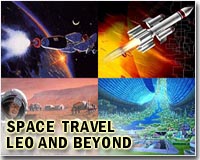 |
Washington (AFP) April 8, 2011 Fifty years after Yuri Gagarin became the first man in space, the US space shuttle program is winding down leaving former rival Russia as the only nation able to carry astronauts into orbit. After its last shuttle flight set for late June, NASA will count on Russian Soyuz capsules to bring its astronauts to the International Space Station to the tune of $50 million per seat until a new shuttle is ready. The space shuttle Endeavour is set for its last mission to the ISS in late April, followed by Atlantis in June. The Discovery wrapped up its final voyage in March and is headed for retirement in a US museum. A successor for the 30-year-old shuttle program is not officially expected before 2015, but NASA's chief technologist has admitted it could be a decade before an American space capsule carries astronauts again. The next generation of US space flight will be led by the commercial sector, which has been encouraged by the US government to pursue the creation of new spacecraft and rockets, funded by private business and advised by NASA experts. In addition to seeking a successor to the shuttles, first launched in 1981, the United States is also pondering the future of human space exploration. Some are campaigning for Americans -- who were the first to walk on the Moon in 1969 -- to return there, while others are making a push for exploring Mars or an asteroid. "The future of US human space flight was almost as uncertain (in 1961) as it is today," said analyst John Logsdon, former director of the Space Policy Institute at George Washington University. Congress at the time was restricting its NASA funding largely to Project Mercury, the first US human spaceflight program. And president John F. Kennedy had not yet announced his decision to conquer the Moon with the Apollo program. "So it was the Gagarin flight that was the stimulus to Apollo and everything that followed," explained Logsdon. "Now, 50 years later, we are uncertain about the future. We cannot count on things like Gagarin to clarify things... and to make our mind up on what is in the country's interest." In fact, Kennedy's reasons for taking up the challenge that Gagarin's flight presented to the United States had nothing to do with a strategy for space exploration. "It was for military and political competition. It was a big motivation to get the money," said Logsdon. Stephen Garber, a NASA historian, said cost concerns were an issue in the 1960s, like now. "The historical context was indeed different even though at the time in the '60s, Congress and Kennedy were concerned that the Apollo program was going to be very expensive," he said. Apollo rang up a bill of $150 billion in today's dollars over 10 years, pushing NASA's budget up to about two percent of US gross domestic product, compared to just 0.5 percent of GDP today. The space agency's annual budget is now about $18 billion. The United States is now not only facing astronomical budget deficits, but the Cold War rivalry with the Soviets has dissipated. "Today, a lot of people say that the Chinese are the new rival and I don't think it's the same thing either," Garber said, calling the current US space strategy "very uncertain." Logsdon agreed, noting that China's human space flight missions have been few and far between. The real challenge for the US space program is agreeing on a vision for the future. As of now, the only point most in NASA can agree upon is that experimentation and exploration at the orbiting International Space Station will figure prominently in US space plans for the next decade. "We do need more policy debate otherwise we are going to be sort of floundering," Garber said.
Share This Article With Planet Earth
Related Links Space Tourism, Space Transport and Space Exploration News
 Russia seeks to regain Gagarin spirit in space
Russia seeks to regain Gagarin spirit in spaceMoscow (AFP) April 8, 2011 Fifty years after Yuri Gagarin's historic flight, Russia still prides itself on launching more satellites than anyone else and will soon have full responsibility for taking Americans into space. But although Russia will this year enjoy the delicious historical irony of providing the only means for launching US astronauts, its own modern space programme has been characterised by a lack of amb ... read more |
|
| The content herein, unless otherwise known to be public domain, are Copyright 1995-2010 - SpaceDaily. AFP and UPI Wire Stories are copyright Agence France-Presse and United Press International. ESA Portal Reports are copyright European Space Agency. All NASA sourced material is public domain. Additional copyrights may apply in whole or part to other bona fide parties. Advertising does not imply endorsement,agreement or approval of any opinions, statements or information provided by SpaceDaily on any Web page published or hosted by SpaceDaily. Privacy Statement |